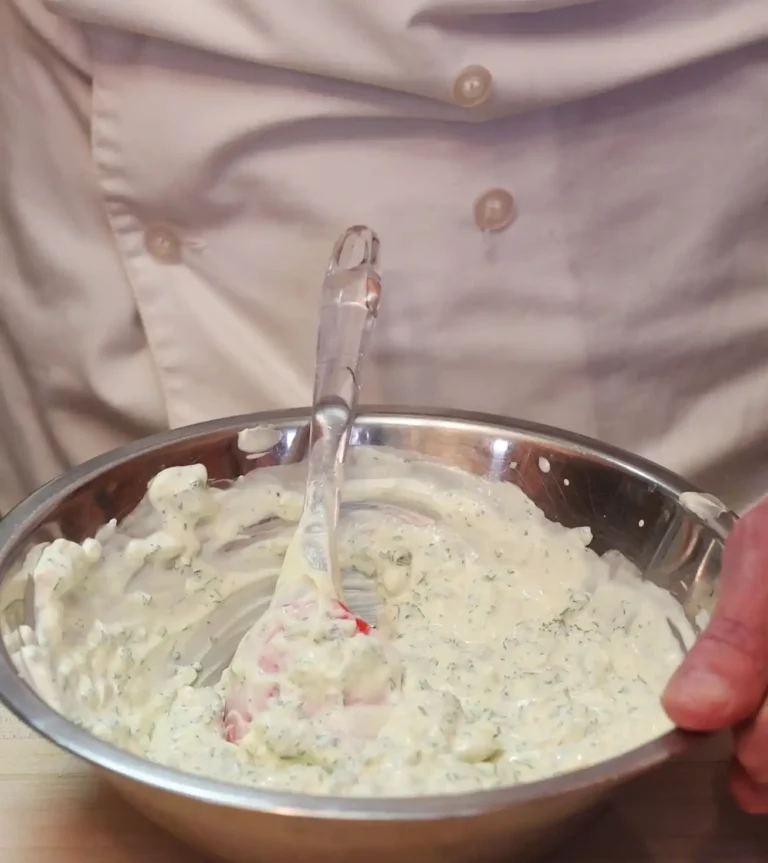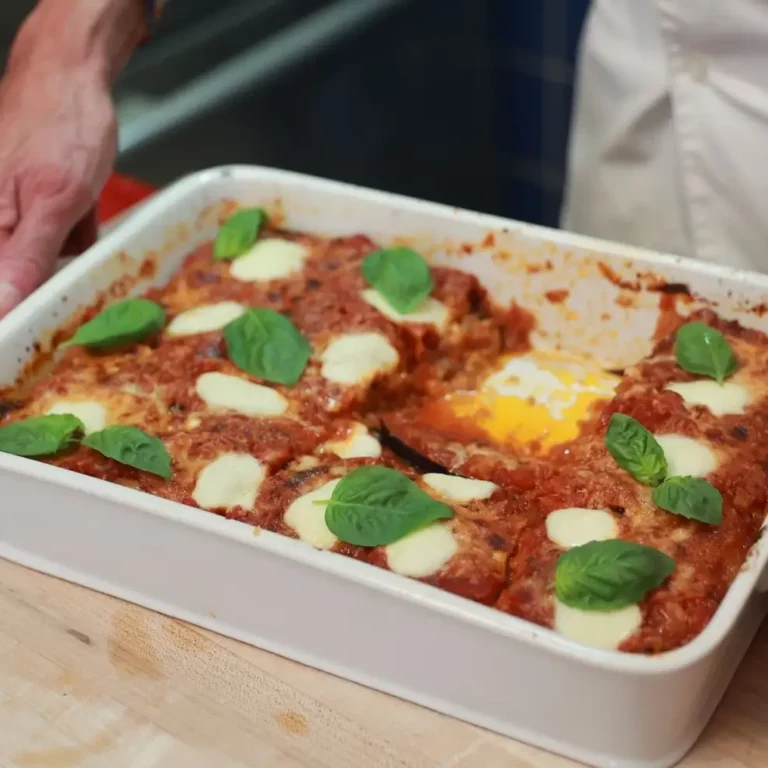Neapolitan-Style Pizza Dough Recipe (Without a Pizza Oven)
When it comes to pizza, everything starts with the dough. A well-fermented, airy crust is what makes Neapolitan pizza so special — pizza dough that is soft on the inside, slightly crisp on the outside, and full of flavor.
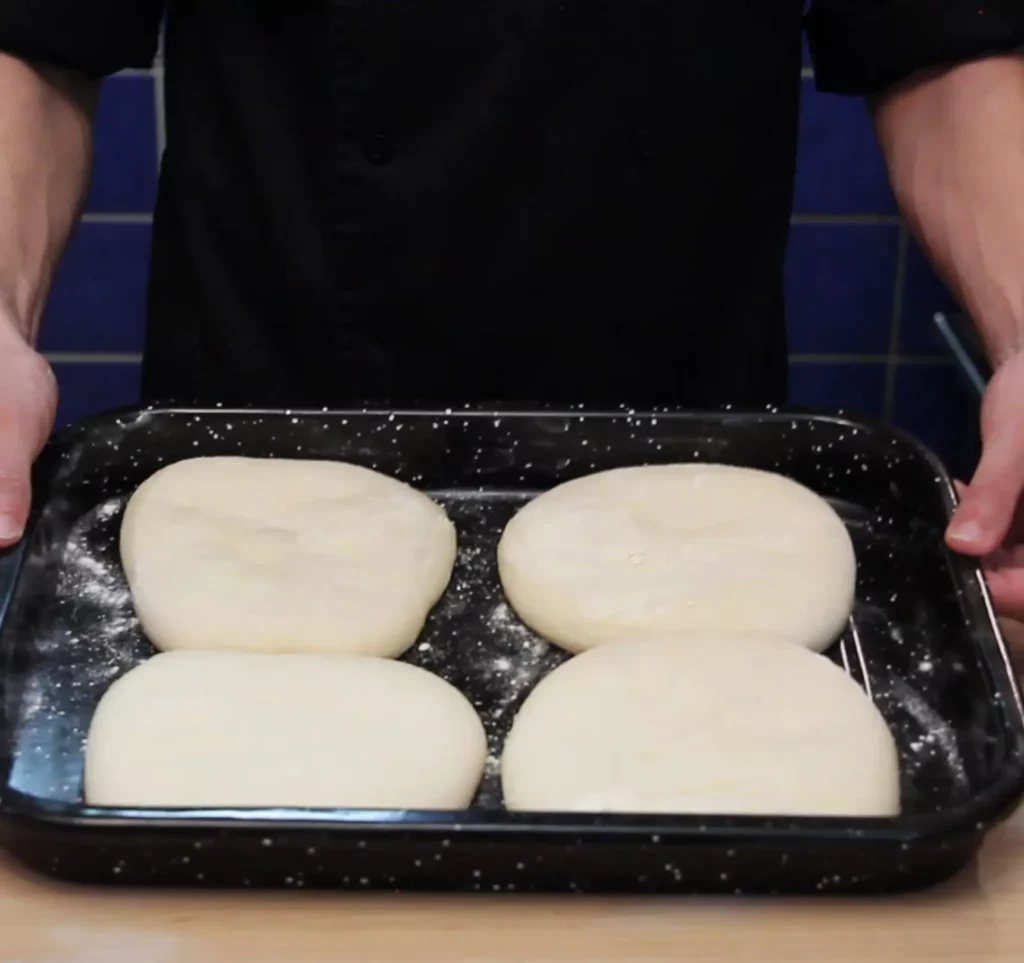
While true Neapolitan pizza requires a blazing wood-fired oven, this recipe adapts the traditional dough so you can achieve a similar result at home using your kitchen oven, a pizza stone, or even a preheated baking tray.
In this post, we’ll walk step by step through the process — from kneading to fermentation — along with chef’s tips, substitutions, and troubleshooting advice.
Why This Neapolitan-Style Dough Recipe Works
- Minimal ingredients: Just flour, water, yeast, and salt.
- Cold fermentation: A 24–48 hour slow rise develops superior flavor and texture.
- Perfect hydration: About 62% hydration for elasticity and easy stretching.
- Home-oven friendly: Works with a pizza stone or preheated baking sheet.
- Versatile: Ideal for Margherita, Marinara, or any toppings you love.
Ingredients (4 pizzas, 28–30 cm each)
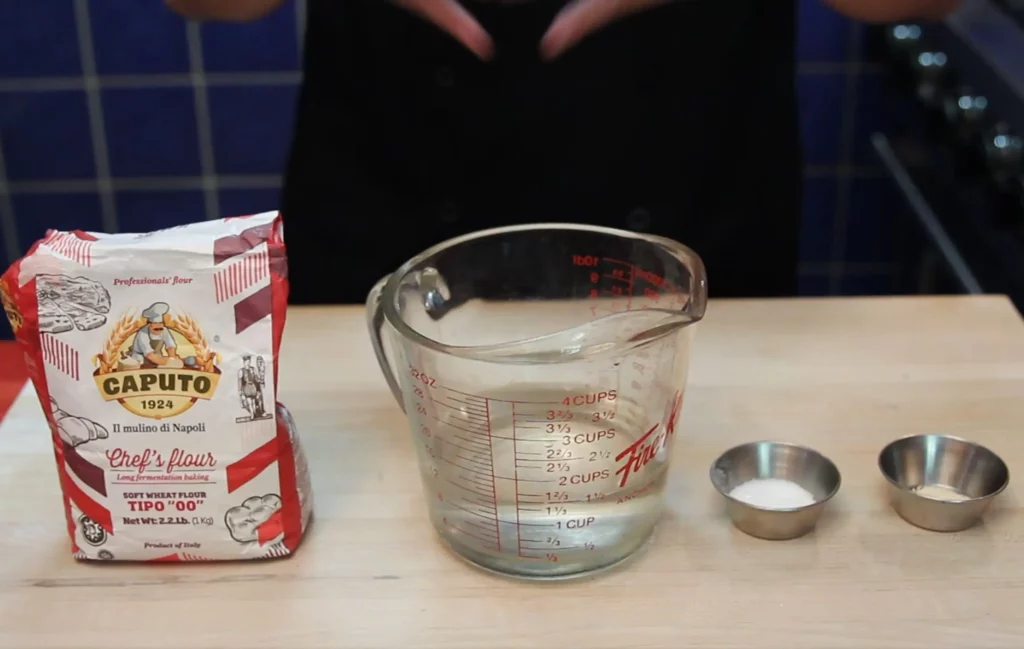
- 600 g tipo 00 pizza flour (or strong bread flour, 12%+ protein)
- 375 ml lukewarm water
- 20 g fine salt (about 3.3% of flour weight)
- 1 g dry yeast (≈¼ tsp) or 2 g fresh yeast
- 1 tsp olive oil (for coating the bowl)
Note: Tipo 00 flour gives the classic soft yet strong texture. If unavailable, use bread flour or a blend of bread and all-purpose flour.
Step-by-Step Instructions
1. Dissolve salt and add yeast
- In a large bowl, dissolve the salt completely in lukewarm water.
- Stir in about 60 g of flour to create a buffer.
- Add the yeast and mix until fully dissolved.
This method protects yeast from direct salt contact, which can weaken fermentation.
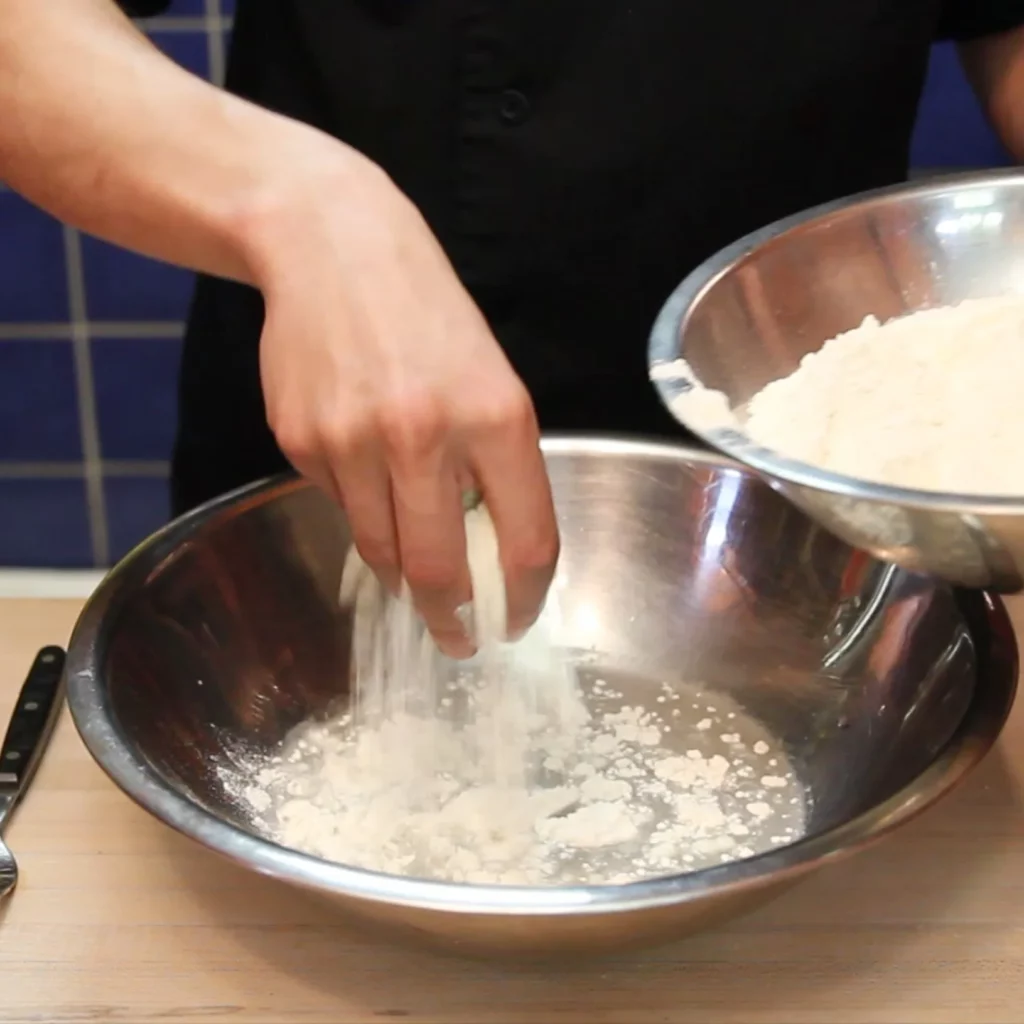
2. Incorporate the flour
- Gradually add the remaining flour, mixing with your hand or a sturdy spoon until a shaggy dough forms.

3. Knead the dough
- Transfer the dough to a clean surface. Knead for 10–15 minutes.
- Use the palm of your hand, pushing forward, folding, and rotating.
- The dough should be smooth, elastic, and slightly tacky.
- Test: Press a finger into the dough. If it springs back, gluten is ready.

4. First fermentation
- Place the dough in a lightly oiled bowl.
- Cover with a damp cloth and let rest at room temperature for 1–2 hours.
- Look for a 10–20% rise, not a full doubling.

5. Divide and ball
- Transfer the dough to a floured surface.
- Divide into 4 equal pieces (~225 g each).
- Shape each into a tight ball by folding edges underneath.

6. Cold fermentation
- Place dough balls in a floured tray or airtight container.
- Cover and refrigerate for 20–48 hours.
This long rise develops flavor, aroma, and digestibility.

7. Before baking
- Remove dough balls from the fridge 1–2 hours before baking.
- Let them reach room temperature before stretching by hand.

Chef’s Tips for Success
- Flour matters: Tipo 00 or strong bread flour = best structure.
- Don’t rush: Longer fermentation (up to 48 h) = better flavor.
- Hydration control: If dough feels too sticky, sprinkle in a little flour. Too dry? Add 1–2 tsp water.
- Skip the rolling pin: Stretch gently by hand to keep air bubbles intact.
- Warm before shaping: Cold dough tears easily.
- Use minimal yeast: Authentic dough relies on time, not yeast quantity.
- Oil the container: Prevents sticking when removing dough balls.

Substitutions
- Flour: Bread flour or 50/50 bread + all-purpose if tipo 00 is unavailable.
- Yeast: Use the same amount of instant yeast, or double if using fresh yeast.
- Fermentation: Minimum 8 h cold rise works, but flavor will be milder.
- Water: Filtered water can improve dough if tap water is hard.
Frequently Asked Questions
Can I freeze pizza dough?
Yes. After shaping into balls, freeze individually. Thaw overnight in the fridge, then rest 2 h at room temp before use.
Why is my dough sticky?
Likely too much water or not enough kneading. Add small sprinkles of flour while kneading.
Can I use this dough for focaccia or bread?
Absolutely — just adjust baking time.
Why not add sugar or oil?
Traditional Neapolitan dough is pure: flour, water, yeast, salt. Additions change texture and aren’t authentic.
Can I use sourdough starter?
Yes, replace yeast with ~100 g active starter, adjusting flour/water to match hydration.

Serving Ideas
Once your dough is ready, try it with:
- Homemade tomato sauce as a base.
- Authentic Belgian fries as a side treat.
- Homemade Caesar salad for freshness.
- Dessert finish: Tiramisu or Rice pudding.
You May Also Like
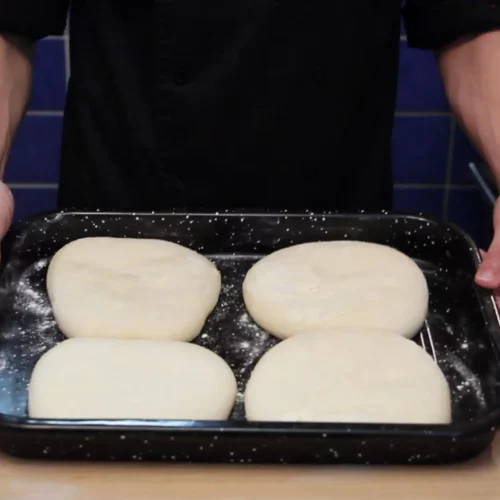
Neapolitan-Style Pizza Dough Recipe (Without a Pizza Oven)
Ingredients
- 600 g tipo 00 flour
- 375 ml water
- 20 g salt
- 1 g dry yeast ≈¼ tsp
- Olive oil for bowl
Instructions
- Mix base — Dissolve salt in the water, stir in 60 g flour, then add yeast and mix well.
- Knead — Add remaining flour, knead 10–15 min until smooth, elastic, and slightly tacky.
- First rise — Place in oiled bowl, cover, rest 1–2 h at room temp until ~10–20% increase (not doubled).
- Divide & ball — Split into 4 pieces (~225 g each), shape into tight balls.
- Cold ferment — Refrigerate covered 20–48 h for slow flavor development.
- Temper — Remove 1–2 h before baking to reach room temp.
- Preheat oven — Heat pizza stone/steel at 260–290 °C (500–550 °F) for 45–60 min; or flip a baking sheet upside down and preheat.
- Shape — Lightly flour surface; stretch each ball by hand into 28–30 cm (11–12 in) rounds, leaving an airy rim.
- Top — Add 2–3 tbsp tomato sauce, mozzarella, basil (or preferred toppings).
- Bake — On hot stone/steel 7–9 min, until crust is golden and spotted. Rotate if needed.
- Finish — Rest 1–2 min on a rack; drizzle olive oil, add fresh basil before serving.
- Tip: Too dry? Add 1–2 tsp water while kneading. Too sticky? Sprinkle with flour as you work.
Video
Notes
Chef’s Tips for Success
- Flour matters: Tipo 00 or strong bread flour = best structure.
- Don’t rush: Longer fermentation (up to 48 h) = better flavor.
- Hydration control: If dough feels too sticky, sprinkle in a little flour. Too dry? Add 1–2 tsp water.
- Skip the rolling pin: Stretch gently by hand to keep air bubbles intact.
- Warm before shaping: Cold dough tears easily.
- Use minimal yeast: Authentic dough relies on time, not yeast quantity.
- Oil the container: Prevents sticking when removing dough balls.
Substitutions
- Flour: Bread flour or 50/50 bread + all-purpose if tipo 00 is unavailable.
- Yeast: Use the same amount of instant yeast, or double if using fresh yeast.
- Fermentation: Minimum 8 h cold rise works, but flavor will be milder.
- Water: Filtered water can improve dough if tap water is hard.
🔗 Useful Links
🛒 Michel Dumas Shop : Explore our kitchen essentials, including aprons and knives.
🌐 Linktree : Access all our important links in one place.
📱 YouTube | Instagram | Facebook | TikTok : Follow us for the latest recipes and culinary

